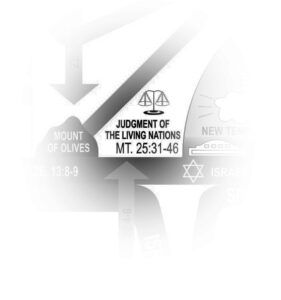To Mr B R
Beloved Brother
… I believe that the beast will put his foot on countries other than those that form his body. I do not believe that Ireland will make up part of the body of the beast. The positive blindness which will weigh and influence England to be spared him, but it will probably be under the judgment which will come on those who live in recklessness on “the isles”. I think that God will use it as testimony, that it is England’s own error which will blind it, and that Ireland will be to a certain degree an oasis, albeit that the yoke of England, which favours Popery governmentally, will weigh on it. It will be a shelter, but I prefer to trust God, whatever it may be, than Ireland or the United States. Nothing will be decided enough, or powerful enough, to make it a counterweight to “the woman riding the beast”, for Russia is outside and has its own way. God will be infallibly enough for all those who confide in him. He makes all things work together for the good of those that love Him.
As to C and H at Lausanne, it is no doubt sad; and I believe that G has in fact troubled the brethren by his way of acting. The sisters noticed this spirit in G and made him feel it. They are right and wrong as to faith. C has, I accept, something to say, and his silence tends to restrict the limits of the good which might be done in Lausanne. On the other hand, as for those who were excluded, I assure you that they do not feel a lot of regret, save for themselves. They are members of Christ, and God keeps from the sin of despising them, but the mixture of spirituality in forms, together with the effort to please the world, and conformity to the world, will be the ruin of the brethren and of the testimony. It is good that dear G has had this humiliation, for he is very thorough and others go as he hears it, but in the long run, if he learnt what God teaches him, God would become outside it and the brethren with him in a condition where they belong to the narrow way, so as to bring them into a broad field of blessing. Dear C, if he had had a little more faith, could have been very useful. In fact, in Lausanne, nobody has confidence in him. Hearts that he wins by his amiability only harm him. I have put before him what I could, but he takes it a bit haughtily. If there was still somebody who exercised an independent ministry there, so that it was not always G alone who acted, the difficulty would disappear, but it is God alone who can send this. In waiting, the brethren have the consciousness of their integrity, and the flesh in G is not fully put to death, and by his character and decision, it is he himself who leads more or less. Co, who does not enjoy the confidence of the brethren, feels his wrongs, and this has been so in the sense that he has been offended without this being intended. The desire to serve the Lord with integrity is found with the brethren, but they have this without the flesh, which always harms, being mortified enough so that it does not become a stumbling block. I hope that they will bring their case enough to God so that, having exercised and humiliated them, He can bless them in spite of their flesh. This is where I was when I left Lausanne. G was not completely happy; I have left the matter to God. It is a matter of the state of all, not of one decision to take, especially since I could not stay there any more. The sisters think that I do not judge things thoroughly; they make a mistake, but I do not have my feelings involved like them. Only I can leave things to God, because I think that at the bottom the brothers seek the glory of God with integrity. I bear with the malcontents more than the brethren would like, perhaps, for in accepting the grievances of the brethren as to them, and there is a lot of this, I think that their flesh partly gave opportunity to this discontent, and that they can never justify the flesh. But I have confidence in God.
As to brother H, my relations with him are good, and I leave it there. I do not believe that he has enough faith to be a testimony under certain conditions. The old dissidents have their character in them. In the way of faith, they have been recognised, as God always does. The world has deceived them.
I am unable to walk, having sprained my right foot, but God, in His great goodness, has given me to profit much from my time with the Word.
Yours very affectionately




